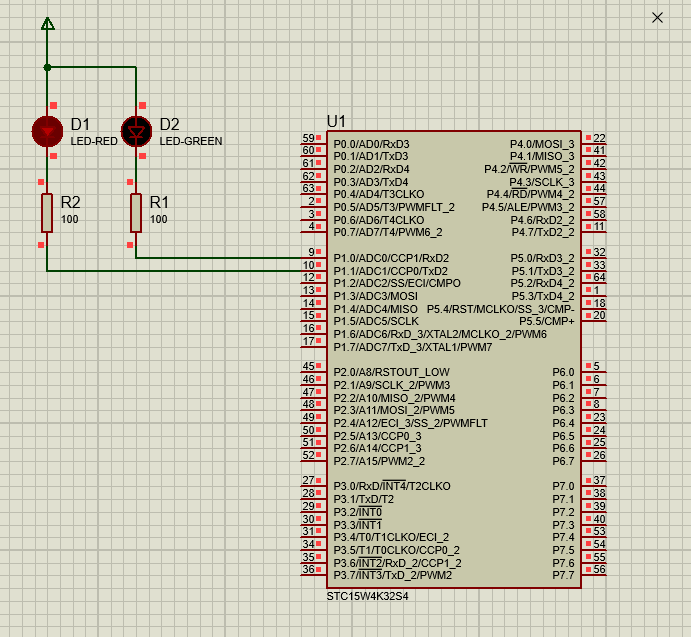Protothread 一个非常巧妙的轮询式多线程模型,也是 contiki 系统的内核,uip 和 lwip 作者 adam 的杰作
 proteus8.12.SP0 居然都支持 STC 51 单片机和 STM32 模拟了。。可以去百度下载 proteus8.12.SP0 居然都支持 STC 51 单片机和 STM32 模拟了。。可以去百度下载
常见问题:
一、proteus 8.12_sp0和proteus_8.9sp2存在相同的问题,如果安装在非C盘目录下,打开后则会显示密钥错误和未注册的灰色字体;点击帮助后也是未注册。
这是因为破解器默认是你安装在C盘。
解决方法如下:
[1]、卸载后重装在C盘
[2]、1.先在C盘安装,破解.
2.打开软件,发现有注册信息,则注册成功
3.此时软件复制根目录的bin文件夹。
4.卸载刚才安装的proteus
注意:不要用第三方的卸载软件,在控制面版里卸载就行,更不要用everything之类的把残余文件删的干干净净
5.重新安装,选择D盘。破解
6.把刚才复制bin文件夹覆盖到D盘软件的根目录下,选择全部替换
7.再打开proteus就显示注册成功了
-- 虽然有点脱裤子放屁的感觉,但能用就行
Protesu 仿真测试,两个线程控制 LED 闪烁,另外还有 mutex timer 等,可以参考 contiki 的内核实现。

示例工程:
 STCxx_Projects.rar
(169.57 KB, 下载次数: 17)
STCxx_Projects.rar
(169.57 KB, 下载次数: 17)
单片机源程序如下:
- /**
- ******************************************************************************
- * @file main.c
- * @author Iron
- * @date 2021-01-01
- * @version v1.0
- * @brief main c file
- */
- /* Private includes ----------------------------------------------------------*/
- #include "board.h"
- #include "pt.h"
- #include "delay.h"
- /* Private define ------------------------------------------------------------*/
- /* Private macro -------------------------------------------------------------*/
- /* Private typedef -----------------------------------------------------------*/
- /* Private variables ---------------------------------------------------------*/
- /* Two flags that the two protothread functions use. */
- static int protothread1_flag, protothread2_flag;
- /* Private function prototypes -----------------------------------------------*/
- /**
- * The first protothread function. A protothread function must always
- * return an integer, but must never explicitly return - returning is
- * performed inside the protothread statements.
- *
- * The protothread function is driven by the main loop further down in
- * the code.
- */
- static int protothread1(struct pt *pt)
- {
- /* A protothread function must begin with PT_BEGIN() which takes a
- pointer to a struct pt. */
- PT_BEGIN(pt);
- /* We loop forever here. */
- while (1)
- {
- /* Wait until the other protothread has set its flag. */
- PT_WAIT_UNTIL(pt, protothread2_flag != 0);
- /* thread code... */
- led_togger(LED0);
- delay_ms(100);
- /* We then reset the other protothread's flag, and set our own
- flag so that the other protothread can run. */
- protothread2_flag = 0;
- protothread1_flag = 1;
- /* And we loop. */
- }
- /* All protothread functions must end with PT_END() which takes a
- pointer to a struct pt. */
- PT_END(pt);
- }
- /**
- * The second protothread function. This is almost the same as the
- * first one.
- */
- static int protothread2(struct pt *pt)
- {
- PT_BEGIN(pt);
- while (1)
- {
- /* Let the other protothread run. */
- protothread2_flag = 1;
- /* Wait until the other protothread has set its flag. */
- PT_WAIT_UNTIL(pt, protothread1_flag != 0);
- /* thread code... */
- led_togger(LED1);
- delay_ms(100);
- /* We then reset the other protothread's flag. */
- protothread1_flag = 0;
- /* And we loop. */
- }
- PT_END(pt);
- }
- /**
- * Finally, we have the main loop. Here is where the protothreads are
- * initialized and scheduled. First, however, we define the
- * protothread state variables pt1 and pt2, which hold the state of
- * the two protothreads.
- */
- static struct pt pt1, pt2;
- int main(void)
- {
- board_init();
- /* Initialize the protothread state variables with PT_INIT(). */
- PT_INIT(&pt1);
- PT_INIT(&pt2);
- /*
- * Then we schedule the two protothreads by repeatedly calling their
- * protothread functions and passing a pointer to the protothread
- * state variables as arguments.
- */
- while (1)
- {
- protothread1(&pt1);
- protothread2(&pt2);
- }
- }
- /**
- * @}
- */
- /******************* (C)COPYRIGHT 2021 ***** END OF FILE *********************/
|